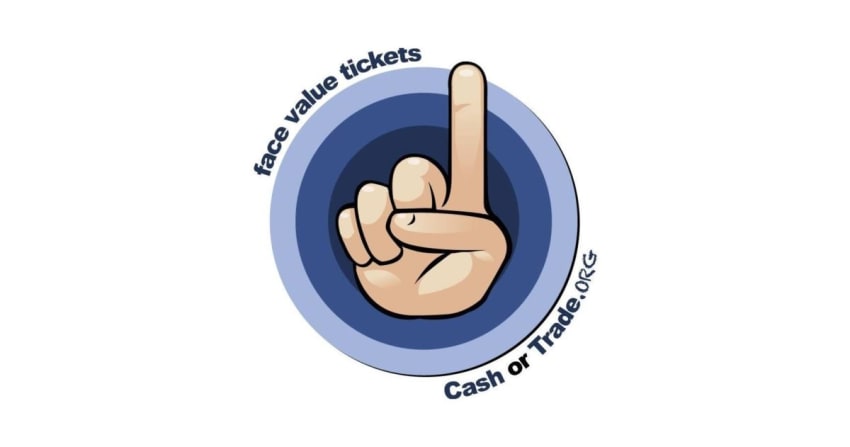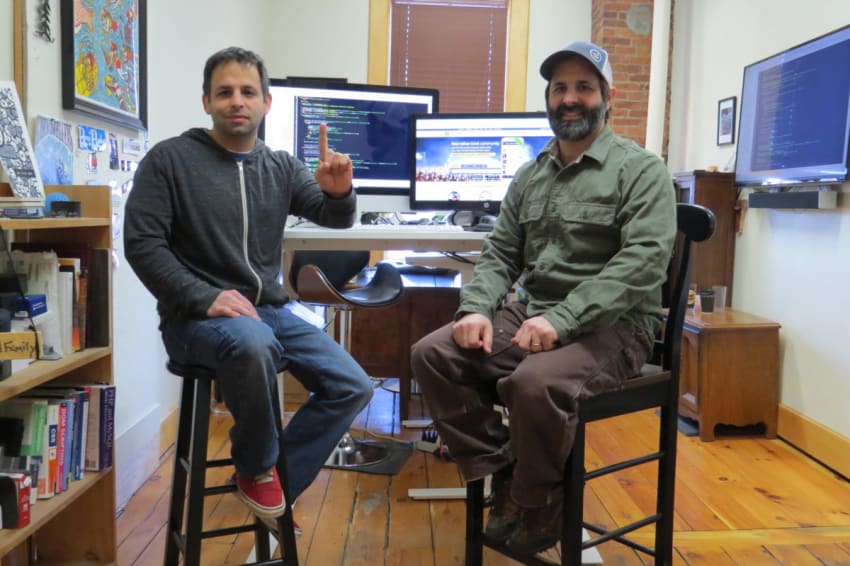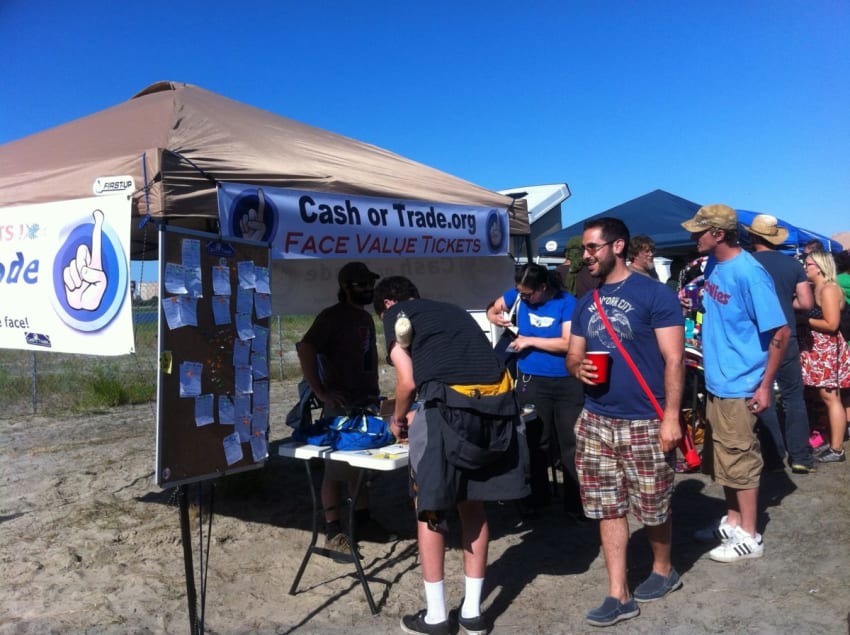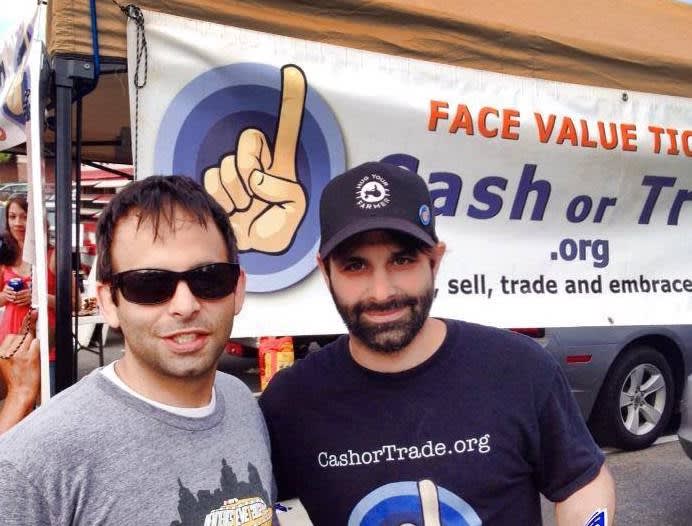Riding The Rail Of The Secondary Market: Brando Rich’s CashorTrade Face-Value Ticket Crusade
By Andy P. Smith May 10, 2017 • 12:27 pm PDT

Words by: Andy. P Smith
Brando Rich grew up in New Hampshire and started seeing Phish as a teenager in the early 1990s. He moved to Vermont to go to school at Johnson State University, about an hour’s drive from Burlington, where he studied environmental science and education.
“I knew I loved Vermont,” he said. “I love the local community, the environmental consciousness, and the political consciousness as well. I knew I wanted to live here so after I graduated I just stayed.”
Twenty years later, Brando is still in Vermont. He lives in Burlington and we spoke over the phone from his office on Church Street where he runs the website CashorTrade.org, a face-value ticket exchange community he and his brother, Dusty Rich, founded in 2009.

For many years the site was a labor of love, a side-project while he and his brother ran a web design company. But recently CashorTrade.org surpassed a major milestone: 100,000 users. And last year, the site facilitated over 100,000 ticket exchange transactions. This new pinnacle gave the brothers a newfound energy and motivation to fully focus on the site and give it all their energies, and Brando is now working full-time on CashorTrade.
“Our goal is to disrupt an industry and be the Airbnb of tickets,” Brando said. “A fan-to-fan exchange is a fun idea among friends, but our plan is to become a real live alternative to the secondary market and compete with these billion dollar scalper companies.”
Brando and his team are currently exploring opportunities for investment and endorsement while actively expanding the site’s offerings for tickets, now totalling over 3,000 artists.
But the site’s preeminent act is Phish, the band around whom they first built the site eight years ago. I wanted to learn a bit more about Brando’s journey, as a Phish fan and entrepreneur, as well as an advocate for the face-value platform and an underdog fighting against Goliaths like StubHub. Just a few weeks after the birth of his son, Leo, Brando was kind enough to take the time to chat about the secondary ticket marketplace, his experience building a 100,000-user platform, and, of course, Phish.
“Phish is the largest ticketed artist on CashorTrade,” Rich said. “I mean, we started in the Phish scene so it makes sense, not to mention, among the secondary ticket market, Phish is one of the most bought and sold tickets there is. It’s up there on StubHub’s charts as being one of the top five [highest percentage of tickets purchased by men] in 2014. And when you think of all the sports and all the tickets period, you know it’s pretty impressive that Phish is one of the most sold and traded acts.”
Quite frankly, Phish shows sell out. And Phish fans will often attend more than one show, so the demand from one fan can be exponential. But is this high demand solely from fans?
“It’s not just the fans but the scalpers too,” Rich said. “The scalpers know the demand, and know they can get more money for the tickets. When it’s not just fans buying the tickets, it’s going to be one of the first or quickest shows to sell out. Phish has taken a few steps to provide tickets to their fans through their lottery, and they have made statements about being against scalping, but I think that is as far as they have gone with it. We are hoping we can sit down with their manager soon to discuss what CashorTrade is doing to help their fans avoid scalping and score tickets for face. Many artists have spoken up about scalping and some are taking a larger stand. The country artist, Eric Church, recently canceled 25,000 of his own tickets that were thought to be purchased by scalpers.”
Indeed, the war on scalpers has battles waged not just by concert goers but also musicians themselves. Some musicians go so far as to require the credit card used for the ticket purchase to be shown to redeem the tickets at will call. But Brando Rich doesn’t quite see that as the solution.
“It does reduce the freedom of the purchase,” he said. “Maybe you want to buy a ticket for somebody’s birthday? Bands that are doing that are really restricting the freedom that a fan has with their ticket.”
In 2009, Brando and Dusty were heartbroken after being shutout when trying to purchase tickets for Phish’s return from hiatus run in Hampton, Virginia. And they were even more upset to find so many tickets being resold for $2,000 each on StubHub.
“Having been web designers for 15 years, at the time, Dusty and I felt something had to be done, something to change it,” Rich said, “Something finally for fans. CashorTrade was an idea that could disrupt the secondary ticket market and offer the first alternative from the scalping industry.”
So they started building the site and launched within just a couple of weeks. “We just kind of threw it up to see what would happen,” Rich said. “Later that summer we went on tour and set up the CashorTrade tent on lot. People used the tent as a spot to meet up with friends and make trades. By the end of the year we had 5,000 registered members on the website.”

And since then, Brando and Dusty Rich have maintained the site as a side project, but having recently sold their web design company, they’ve made the move to work on CashorTrade full-time.
“We have built a small team and are coming out swinging for this summer,” Brando said. “As the site has reached 110,000 members, there was just no way to continue with the same success as a part-time thing. We all see the real potential it has and it is time that we give it what it deserves. We’re motivated and have a lot of energy to bring it to the next level. We have begun to reach out to the investor community and are seeing what we can do to be a real competitor to these billion-dollar companies.”
The global secondary ticket market is a $9 billion annual industry and StubHub has roughly 50 percent of that market.
“If we could obtain at least one percent, that’s $90 million of the market.” Rich said. “If we could obtain a percentage of the market while being a sustainable and conscious business model that works and supports fans rather than exploiting them. That’s really it right there. Rather than having this fun, fly by night idea, let’s make this something that can be widespread, sustain itself with growth, be a viable alternative and carry an equal name in the secondary market.”
And now, as Phish’s summer tour approaches, as everyone gears up for festival season, how can we, as concert goers, avoid paying scalper prices on sites like StubHub? What’s a fan to do?
“I would say get on CashorTrade and make a profile right away,” Rich said. “Even if you just make a post that’s ‘in search of,’ you know, it gets it out there and it gets people knowing that you’re looking. You’ll get more exposure there than anywhere else. Not only is there a chance that someone has an alert set up that they can receive a text message or a push notification that you made your post, but it’ll also blast out to social media. We now have a Facebook and Twitter group for every state in the country as well as for many bands. So, a post on CashorTrade could go to up to six Facebook groups and six Twitter groups in one shot.”
Rich continues to extol the benefits of CashorTrade with an almost laissez-faire, “why not?” approach.
“If you ever have the chance to buy or sell a ticket, even if it’s with a friend, use the platform and gain a review,” Rich said. “Often I’ll see trades happen on Facebook and I’ll chime in and tell them how they both deserve credibility for the face value trade they just made. People are like, ‘Oh, I didn’t realize that.’ Why not go to the site? Sure, you met on Facebook, but you should finalize on CashorTrade. It doesn’t cost you anything and in the end you both end up with a review building your credibility for future trades. We are building trust and credibility within the movement. It’s always been a question, even on StubHub, to see if these tickets are good. We’re providing a transparency that doesn’t exist on any other secondary reseller site.”
Then, to play the devil’s advocate, I asked Rich how would you explain CashorTrade to somebody who just discovered that the Lady Gaga tickets they bought could be sold for 300 percent what they paid for them on StubHub? What would you say to that person? Why shouldn’t they sell it for as much money as they can?
“About 50 percent of the people on secondary sites like Stubhub are scalpers or brokers,” Rich said. “The other half are people like you and me. We just want to make our money back, and maybe pass them along to somebody who’s excited to go instead of needing to play businessman. However, those fans who do want to make a profit may find that it’s not so easy. They may go ahead and list them for exorbitant prices, only to find that the show is a couple weeks away and they are now competing with thousands of other scalpers. Then they look at the fees and the percentage StubHub’s taking. They begin to realize they they are not even going to get as much as they were hoping.
“But OK, they continue to keep it posted and maybe adjust the price a couple times as they see who they are competing against. Now there’s only a week left before the show they’re saying, ‘I’ve got $600 in tickets here, why didn’t I just get my money back?’ Instead they probably have a few hours invested in the project listing the tickets, adjusting the prices, competing with scalpers… The fact of the matter is, there’s a large percentage of people who didn’t buy the ticket to make money, they bought the ticket to go and when they can’t go, most people just want to get their money back.”
As I’m writing this, there are currently hundreds of tickets listed on StubHub for each of Phish’s Baker’s Dozen shows this summer. And all of them are listed above face value. I can honestly say that, yes, I have paid over face for a ticket here or there in my years. But Brando Rich has never paid more than face.
It seems that Phish fans have become a bit more intense in recent years: more particular about their seats, their space to dance, their view of the stage … I asked Brando Rich if this may be a symptom of the increased demand and increased price for tickets.

“Yeah, sure,” Rich said. “Some people spent a lot of money on the scalper market to purchase tickets and if they throw down $400, they’re more demanding to get that seat. However, these experienced fans have become quite picky about where they want to be in a venue and they know they can get it if they work hard enough for it. Granted, you can’t discredit the number of kind fans that are still out there with that ‘Grateful Dead miracle’ vibe, like, ‘Yes, brother, yes sister, there’s always extra room.’ However, I will say there is less of that today. There’s a lot less of that today. And I don’t know why. I’ve never kicked a person out of a seat. Most of the time I don’t go to the seat that I bought.”
I told Brando that my favorite shows were the ones where my neighbors and I came together to enjoy the music, share the space, share the groove. I can remember so many shows where it was very casual in that regard, but in recent years it seems to have changed.
“You’re right,” Rich said. “I miss that. It’s been sort of a personal ethic of mine, I suppose, growing up going with the Grateful Dead, and going to the early Phish shows. That vibe was why I wanted to go to shows, that love for each other, you know, that kindness. They accepted everyone, that was revolutionary compared to this status quo, and it’s why I wanted to be a part of it. Yes, it was about the music, and yes, it’s about the friends, but it was about the vibe too.
“You can’t blame people too, you know,” he added. “My friends who ride the rail? They work hard for their seats and they get there and they do it right. They hold up their spot, they get down, you know they’re not just sitting there or standing. If that’s the way you want to enjoy the show, that’s fine. But if you want to be front and center, you might want to be showing the most enjoyment possible and fire up the people around you too. Get down! Help people let down their hair and get rid of those insecurities about how they might look or dance or act, you know. A show is supposed to be about letting loose and letting the music drive you.”
But there is an intensity, a specific intensity, that I can’t quite put my finger on, that some fans have at shows that often takes away from that vibe, that experience.
“If I could relate it to something,” Rich said. “I’d say coming from Vermont in ski season, there’s a saying, ‘No friends on a powder day.’ If it’s a sick day and it just dumped snow, and you’re up there first chair. You’re not waiting for anyone. You’re immersing yourself in the snow and catching those fresh tracks before anyone else. I could say the Phish community is very much like that sometimes They want to be right up there in the best seat possible and soak it up with the same feeling they get from carving down the mountain. They’re getting front row, dancing. I think that’s awesome. At the same time, having been to so many shows, I’m like ‘Hey, if I don’t get front row this time, that’s OK. We’ll get it next time.’ You didn’t score your front row this time, then give it to someone else this time. Experience it at a different view. I mean, you don’t want the same thing again and again.”
Andy P. Smith lives in Brooklyn and runs the site PhanSite.com
